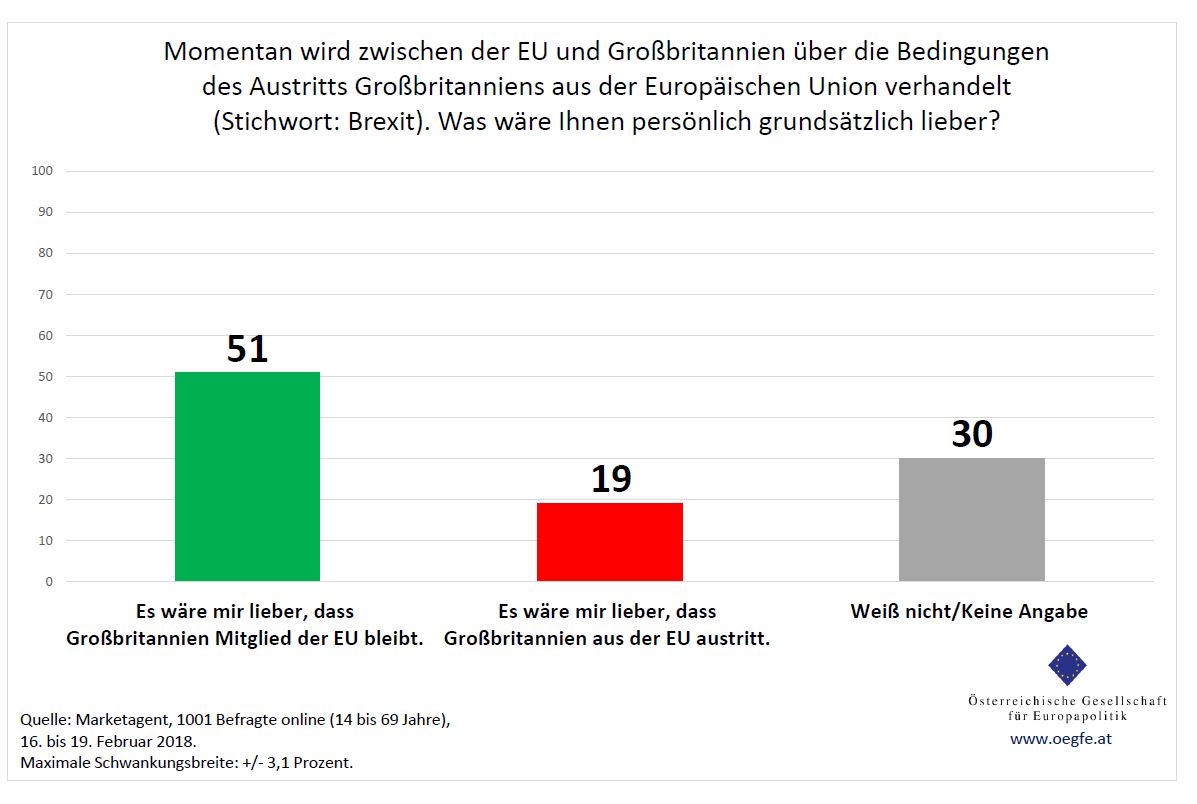Wenn es nach der Meinung der Österreicherinnen und Österreicher ginge, so steht fest: Großbritannien sollte Mitglied der Europäischen Union bleiben. Zu diesem Ergebnis kommt eine österreichweite online-Umfrage, die im Auftrag der Österreichischen Gesellschaft für Europapolitik durchgeführt wurde.
51 Prozent der Befragten sagen in der von 16. bis 19. Februar online unter 1001 ÖsterreicherInnen durchgeführten Umfrage, dass es ihnen lieber wäre, wenn Großbritannien EU-Mitglied bleiben würde. Eine/r von fünf Befragten (19 Prozent) würde es vorziehen, dass das Vereinigte Königreich die Union verlässt. Eine/r von drei Befragten (30 Prozent) kann oder möchte zu dieser Frage nicht Stellung beziehen.
Bereits vor der Brexit-Abstimmung war eine Mehrheit der ÖsterreicherInnen der Ansicht, dass es keine gute Idee Großbritanniens wäre, die EU zu verlassen. So hatten sich im Februar/März 2013 65 Prozent für den britischen EU-Verbleib ausgesprochen und nur 23 Prozent für einen Austritt (12 Prozent „weiß nicht/Keine Angabe). Im Juli 2015 lautete das Verhältnis 48 Prozent (für EU-Verbleib Großbritanniens) zu 27 Prozent (für Austritt), wobei sich die Zahl der Unentschlossenen verdoppelt hatte (25 Prozent).
Ein Brexit würde, so gaben Anfang Juni 2016 64 Prozent der Befragten an, das weltpolitische Gewicht der EU verringern. 56 Prozent sahen negative Folgen für das globale Standing Großbritanniens. Nur 10 Prozent bzw. 15 Prozent glaubten damals, dass der weltpolitische Einfluss der EU bzw. Großbritanniens steigen würde (Rest auf 100 Prozent = „weder positive noch negative Auswirkungen“ / „weiß nicht/Keine Angabe“).
Die aktuelle Umfrage wurde von marketagent.com in der Zeit von 16. bis 19. Februar 2018 im Auftrag der ÖGfE durchgeführt. Befragt wurden österreichweit 1001 Personen online (repräsentativ für die österreichische Bevölkerung im Alter von 14 bis 69 Jahren/Gewichtung nach Geschlecht, Alter und Bildung). Maximale Schwankungsbreite ca. +/- 3,1 Prozent. Vergleichsumfragen: Sozialwissenschaftliche Studiengesellschaft (SWS) im Auftrag der ÖGfE, Telefonische Umfragen österreichweit, N=571 Befragte (2013), N=528 (2015), N=559 (2016).
Weitere interessante Artikel
23. Juli 2024
Krone TV “Nachgefragt”: Wichtige Wahl für EU – Harris gegen Trump
Paul Schmidt spricht im Krone TV-Interview über die Bedeutung des US-Wahlkampfs für die EU, die Sicht der Europäischen Union auf Ungarns aktuelle Ratspräsidentschaft und die Prioritäten der wiedergewählten Ursula von der Leyen.
22. Juli 2024
Puls24 NEWS: EU-Parlament kommt erstmals seit Wahl zusammen
Paul Schmidt, Generalsekretär der österreichischen Gesellschaft für Europapolitik, spricht im Puls24 NEWS Interview über die erste Sitzung des EU-Parlaments nach der EU-Wahl im Juni. Als mögliche Themen werden die Neubesetzung zahlreicher Spitzenjobs und der Ratsvorsitz Ungarns erwartet.
11. Juli 2024
The European Union in Search of Its Own Mythology
By: Olena Pokotilo
The attractiveness of the European Union is based on its economic and social model as well as on its manifold national cultural heritage. Throughout the post-Cold War period, the EU has not actively promoted pan-European myths and struggles today with creating a cohesive and credible common narrative. In this context, the author of this Policy Brief argues that to maintain its unity amidst global instability and evolving political landscapes, the EU must develop new, meaningful myths. She discusses the characteristics of the myth-design of the Union and offers policy recommendations.
The attractiveness of the European Union is based on its economic and social model as well as on its manifold national cultural heritage. Throughout the post-Cold War period, the EU has not actively promoted pan-European myths and struggles today with creating a cohesive and credible common narrative. In this context, the author of this Policy Brief argues that to maintain its unity amidst global instability and evolving political landscapes, the EU must develop new, meaningful myths. She discusses the characteristics of the myth-design of the Union and offers policy recommendations.
Neueste Beiträge
Weitere interessante Artikel
23. Juli 2024
Krone TV “Nachgefragt”: Wichtige Wahl für EU – Harris gegen Trump
Paul Schmidt spricht im Krone TV-Interview über die Bedeutung des US-Wahlkampfs für die EU, die Sicht der Europäischen Union auf Ungarns aktuelle Ratspräsidentschaft und die Prioritäten der wiedergewählten Ursula von der Leyen.
22. Juli 2024
Puls24 NEWS: EU-Parlament kommt erstmals seit Wahl zusammen
Paul Schmidt, Generalsekretär der österreichischen Gesellschaft für Europapolitik, spricht im Puls24 NEWS Interview über die erste Sitzung des EU-Parlaments nach der EU-Wahl im Juni. Als mögliche Themen werden die Neubesetzung zahlreicher Spitzenjobs und der Ratsvorsitz Ungarns erwartet.
11. Juli 2024
The European Union in Search of Its Own Mythology
By: Olena Pokotilo
The attractiveness of the European Union is based on its economic and social model as well as on its manifold national cultural heritage. Throughout the post-Cold War period, the EU has not actively promoted pan-European myths and struggles today with creating a cohesive and credible common narrative. In this context, the author of this Policy Brief argues that to maintain its unity amidst global instability and evolving political landscapes, the EU must develop new, meaningful myths. She discusses the characteristics of the myth-design of the Union and offers policy recommendations.
The attractiveness of the European Union is based on its economic and social model as well as on its manifold national cultural heritage. Throughout the post-Cold War period, the EU has not actively promoted pan-European myths and struggles today with creating a cohesive and credible common narrative. In this context, the author of this Policy Brief argues that to maintain its unity amidst global instability and evolving political landscapes, the EU must develop new, meaningful myths. She discusses the characteristics of the myth-design of the Union and offers policy recommendations.






